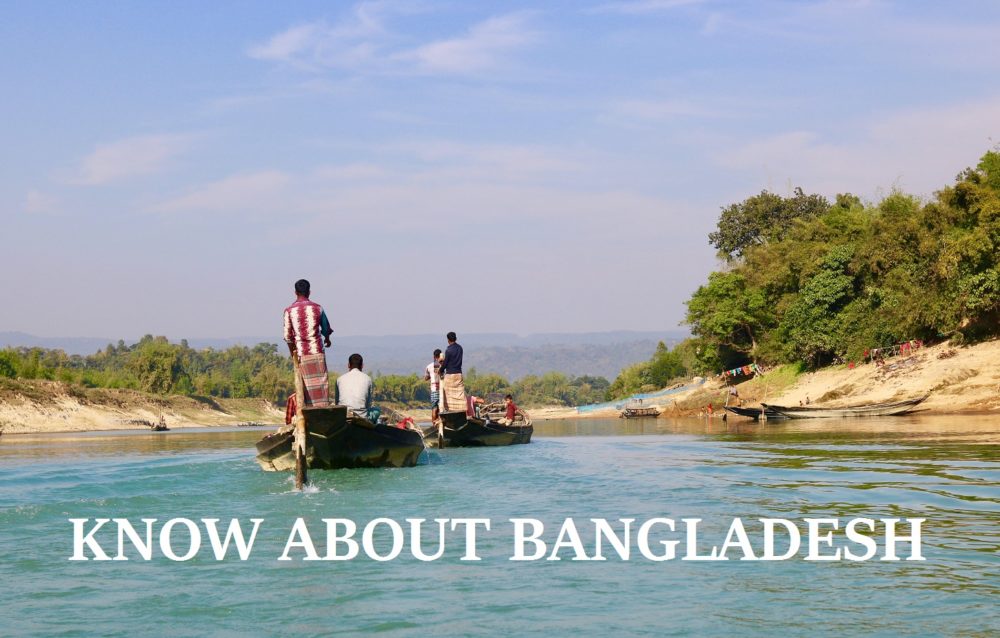
Top things to know about travelling Bangladesh
Top things to know about travelling Bangladesh
If you are planning to visit Bangladesh first time, you might have few questions about this place which you need to be clarified and also you need a general overview. “Top things to know about travelling Bangladesh” article will give you a general idea about Bangladesh.
History of Bangladesh-
History indicates that Bangladesh was dominated by Indian empires. Internal struggles were very common between Hinduism and Buddhism, and Muslim conversion and settlement from Arab and Persian traders and Archbishops began in the 10th century.
The area had mostly Muslim rulers since the 13th century, who started the conversion process by building new mosques and madrassas. The area was eventually known as Bengal.
The British Raj began in 1757 in this subcontinent by defeating Mughal emperor Nawab Siraj-ud Daulah (the last independent Nawab of Bengal). Hindus dominated the western region and Muslims dominated the eastern region when Bengal became part of British India. The British Raj ended with the independence of India in 1947, at which time eastern areas stayed with Pakistan and became East Pakistan. Political exclusion, linguistic discrimination as well as economic neglect by the politically dominant western leaders led to the Bengali independence movement in 1971. The movement was led by the Awami League, founded by Huseyn Shaheed Suhrawardy, who was the leader of the party and the central figure of the Bangladesh liberation movement. He is considered the founding father of Bangladesh. Bangladesh won independence in 1971 after a nine month long devastating war with West Pakistan. During the war at least 3,000,000 people died in Bangladesh.
Key dates of Bangladesh
1947 – British colonial rule over India ends. A largely Muslim state comprising East and West Pakistan is established, either side of India. The two provinces are separated from each other by more than 1,500 km of Indian Territory.
1971 – Independence after a nine-month war, with India backing the Bengali nationalists against Pakistan.
1973 – First parliamentary elections give the Awami League a landslide victory.
1975 – A military coup sees founding president Sheikh Mujibur Rahman and most of his family members killed, putting an end to civilian rule.
1979 – Second parliamentary elections bring former army Chief Ziaur Rahman’s Bangladesh Nationalist Party (BNP) to power.
1981 – Ziaur Rahman assassinated during abortive military coup.
1982 – General Ershad assumes power in army coup. He suspends the constitution and political parties.
1991 – Fifth parliamentary elections, brings the BNP under Zia’s widow, Khaleda Zia, back to power. The country returns to a parliamentary system of government.
Festivals
Bangladesh is a unique destination for experiencing festivals, with Bangladeshi people celebrating many festivals throughout the year.
Religious and cultural celebrations
- Muslim people celebrate Eid-ul-Fitr, Eid-ul-Azha, Eid-e-Miladunnabi, Muharram.
- Hindu people observe Durga Puja, Kali Puja, and Sarashwati Puja among others.
- Buddha Purnima is the biggest festival for Bangali Buddhists.
- Borodin (Christmas) is celebrated by the Christians.
- Tribal communities also celebrate their own religious and cultural festivals.
Temporal celebrations
- Pohela Boishakh (Bangla New Year) is the biggest among all the festivals in Bangladesh.
- Nobanno Utshob (New Rice celebration) is another of our festivals, which is strongly based in rural Bangladesh. When the farmers get new rice, they observe this day with rice flour and sugar mixed with water and puffed rice.
- Shahid Dibash (21st February) is celebrated as international mother language day all over the world. We celebrate this day to commemorate the memories of the martyrs, who laid down their lives for our mother tongue Bangla on 21st February in 1952.
Music, dance and drama
The music and dance styles of Bangladesh may be divided into three categories: classical, folk, and modern. The classical style has been influenced by other prevalent classical forms of music and dances of the Indian subcontinent and, accordingly, show some influenced dance forms like Bharata Natyam and Kuchipudi.
There are several cultural programs held every day in the cities and throughout the country. The cultural activity schedules are listed in our travel blog and you may also wish to explore our specialized cultural trips itinerary on this website.
Social conventions
In a home environment it is acceptable to sit crossed-legged on cushions or the sofa. If a visitor wishes to bring a gift, money must not be given as it may cause offence. Religious customs should be respected by guests.
Local women should not be specifically photographed unless it is certain that they will not object. Female travellers should wear trousers or long skirts; revealing clothes should be avoided, particularly when visiting religious places. Dress is generally informal for men, though modesty must be maintained. Same-sex relations are illegal.
Population
- As at July 2016 the population of Bangladesh was recorded as 156,186,882.
- Country comparison to the World: 9th largest
Nationality
noun: Bangladeshi(s)
adjective: Bangladeshi
Ethnic groups
Bengali at least 98%, ethnic groups 1.1%
Note: Bangladesh’s government recognizes 27 ethnic groups under the 2010 Cultural Institution for Small Anthropological Groups Act; other sources estimate there are about 75 ethnic groups; critics of the 2011 census claim that it underestimates the size of Bangladesh’s ethnic population (2011 est.)
Languages
Bangla 98.8% (official, also known as Bengali), other 1.2% (2011 EST.)
Religions
Muslim 89.1%, Hindu 10%, other 0.9% (includes Buddhist, Christian) (2013 EST.)
Age structure
0-14 years: 28.27% (male 22,456,564/female 21,695,491)
15-24 years: 19.53% (male 15,261,363/female 15,247,635)
25-54 years: 39.39% (male 29,565,250/female 31,951,537)
55-64 years: 6.77% (male 5,232,828/female 5,342,822)
Read more articles:

